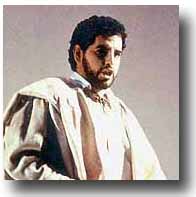2
Juan Diego Flórez... Quote. Unquote.

Soprano Anna Caterina Antonacci on her 'ideal partner' in an interview by
Alberto Corrado for vinile.com...
"Questione di feelings: ci sono cantanti con cui scocca la scintilla, con altri no. L'anno scorso ho cantato alla Scala accanto ad Juan Diego Flórez in Nina Pazza d'amore di Paisiello ; è stata una sorpresa, Juan è molto giovane, l'entusiasmo dei suoi anni è trascinante e penso che avrà un grande futuro"
____________________
Luisa del Rosario on Flórez in L' Italiana in Algeri (Las Palmas, April
1999) for Mundo Classico...
"Lindoro, interpretado por Juan Diego Flórez, fue el que más aplausos cosechó del público, que supo reconocer su calidad vocal tanto en su buena ejecución como en su colocación y timbre lírico demostrado especialmente en 'Languir per una bella'."
____________________
Mikel Chamizo on Flórez in Rossini's Stabat Mater (San Sebastián, June
2001) for Mundo Clasico...
"Juan Diego Flórez estaba falto de ensayos, tuvo algún desajuste, pero su voz es tan grande que nos hizo olvidar cualquier error."
____________________
T.J. Medrek on Flórez's Rossini Arias CD in the Boston Herald, 25 January 2002...
"His Rossini Arias CD from Decca reveals him to possess the light, flexible tenor of one's dreams - he's a kind of male Cecilia Bartoli. Flórez sings arias from The Barber of Seville (the rarely performed 'Cessa di piu resistere'), Otello, La Cenerentola and more. He does it all with the sublime elegance of the great Alfredo Kraus in his prime, but with a far sweeter tone."
____________________
Benjamin Ivry, CD Now...
"It's necessary to go into a different vocal category to find comparisons to Flórez, because already among tenors today, he has no peer in the music he performs."
____________________
Richard Levine of Classics Today on Flórez in Rossini Arias...
"The sound is sweet and warm, the breath control superb, the ability to articulate long upward or downward coloratura passages seemingly easy. The voice retains its round, full quality up to a high D-natural, which fits nicely into a showy roulade as easily as it is stabbed at from an octave or two below it. While you are being dazzled by the precision, you're also taken by the beauty of the tone. [...] The impression we're left with is that Flórez finds song as natural as speech; his ease of execution
is like that of a perfectly-in-shape, expertly trained ballet dancer or downhill
skier."
____________________
Justin Davidson in an article entitled 'Tenors of the Time', Newsday,
3 February 2002...
"As the curtain goes up on Rossini's The Barber of Seville at the Metropolitan Opera, a slight young man with a schoolboy seriousness and dewy good looks is standing onstage, wearing the costume of the courting count Almaviva. The count begins his lovelorn serenade, and his voice emerges glistening, fresh and warm. His name is Juan Diego Flórez, and he has been granted a tenor that is not so much light as it is
weightless. He twirls and glides in the upper register, scattering perfect high notes and slaloming down Rossini's swooping, swerving lines with infinite nonchalance."
____________________
Rudi van Den Bulck of fasolt.com on Flórez in Rossini Arias...
"Most of the repertory he sings has been recorded before by either Rockwell Blake, Raoul Gimenez or Bruce Ford. All three wonderful singers with a wonderful technique as well. What more does Florez offer? He sounds less than a metronome than Blake, has a much better top and more bite than Gimenez, and a more beautiful sound than Ford. The sound - live as on record - is bright, lean, handsomely vibrant and permanently placed forward combined with an excellent enunciation."
____________________
Kenneth Meltzer, Classical CD Review, January 2002, on Rossini Arias...
"Because of his technical brilliance, he is able to approach this fiendishly difficult music with extraordinary confidence and, perhaps even more important, obvious delight in its performance. What a pleasure it is to hear a young singer who so enjoys what he does and is able to communicate that to his audience!"
____________________
Rodney Milnes of The Times on Flórez's Rodrigo in the Royal Opera
House's production of Otello, February 2000...
"Rodrigo is a more conventional Rossini tenor role - ie, high and florid - and Ford's Pesaro colleague Juan Diego Flórez was simply sensational, every note in even the most intricate piece of coloratura knitting securely voiced. These two hurling defiance and top notes at each other is the stuff of which opera is made, or used to be.".
____________________
Enrique Sacau, Mundoclasico, 11 March 2002 in a review entitled 'El
tenor rossiniano del siglo XXI (¿y del XX?)'...
"Para los que digan que todos los tiempos pasados son mejores y que vivimos una espantosa crisis de voces, les diré que el mejor tenor rossiniano que ha existido, en mi opinión, es Juan Diego Flórez."
____________________
Juan Diego Flórez on one of his favourite recipes in 'Heir apparent'
Classic FM Magazine, April 2002...
"You cut really fresh fish into thick slices and put on a lot of lemon juice, which almost cooks the surface of the fish. Add salt, pepper, garlic and leave it for 10 minutes. Then chop onions and parsley, put it together for another five minutes, then you eat!"
____________________
Lucy Hall in 'Heir apparent' Classic FM Magazine, on Flórez's recipe...
"Simple as that - the purest ingredients assembled with the lightest touch. Rather like one of Juan Diego Flórez's performances."
____________________
This page was last updated on: February 28, 2007